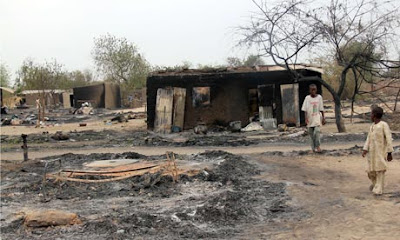Culled from Guardian Uk
Imagine the reaction in Britain or America if 100 police
officers or security agents were shot dead by a secret cult in a single
incident. Or, to put it in another way, where else in the world would
so many crime fighters be killed in one confrontation without a
cataclysmic upheaval within the political system?
Only in Nigeria could 103 people – officers of the police, state security service and mobile police – be killed in the line of duty,
without as much as a formal investigation to find out what happened:
who gave what orders, whether the officers were prepared for the mission
and who was responsible for the brutal massacre that took place. The
conspiracy of silence is indicative of fundamental malfunctions in the
country's security structure. What kind of message is government sending
to security officers? What sort of lessons will they take from the
development?
The clash between police and the Ombatse cult
in Nasarawa state a few weeks ago resulted in a terrible stain even in
the murky waters of rule of law in Nigeria. More than anything else, the
message it conveys to the police and other security agents is that
Nigeria may not be worth dying for. It tells them plainly that should
they make the ultimate sacrifice and die in the line of duty, not only
will they be buried and quickly forgotten (if their bodies can be
found), but that no action will be taken against the perpetrators. In
other words, their lives are expendable.
Maybe it is because the Nigeria army knows this that they went on a rampage in Baga
when some of their men were killed. In retribution for the killing, the
army simply leveled the town, shooting indiscriminately, burning and
pillaging. At the end of the killing orgy, scores of innocent men, women
and children lay dead and over 2,000 homes destroyed. In Baga, as in
Nasarawa, not even the usually worthless government commission of
inquiry was constituted to at least pretend a level of concern. In both
cases, parties took the laws into their hands, knowing that that would
be the end of the matter.
Make no mistake, the Nigeria police are
no saints. Many innocent people have been killed in police custody, or
even on the streets for no reason. Just last week, the Plateau state
police command dismissed two officers for selling arms to criminals. Bad
eggs in the police have been known to engage in armed robbery. But does
that warrant the most recent slaughter, just weeks after another 50 policemen were also murdered in cold blood with no repercussions while accompanying dignitaries to the burial of a relative of a minor government official?
No
other country in the world would tolerate this level of disregard for
the lives of security personnel. Instead of immediate action to fish out
the perpetrators to deter other criminals and re-establish trust in the
families and colleagues of those who fell in the line of duty, very
little seem to be coming out from government. The inspector-general of
police, Mohammed Abubakar, has not told the country how he plans to
respond, and the director-general of the security services, Ita
Ekpenyong, was quoted recently as saying that the brutal killers had
been "forgiven".
At a candlelight vigil held for the 10 security
agents that lost their lives, he reportedly said, "To those who could
kill the body, note that you have made your community an ignoble
sepulchre of innocent law enforcement agents, and that even though our
spirits and will are cast in iron, we have forgiven you. We have
obediently handed all of you over to the almighty God since he taught us
that vengeance is his."
To put it mildly, this is pure garbage.
It may be politically expedient to "forgive" the deaths of over 100
officers, but the law should run its full course. Are the lives of
Nigerian security agents that expendable? Is murder no longer a crime in
Nigeria?

No comments:
Post a Comment